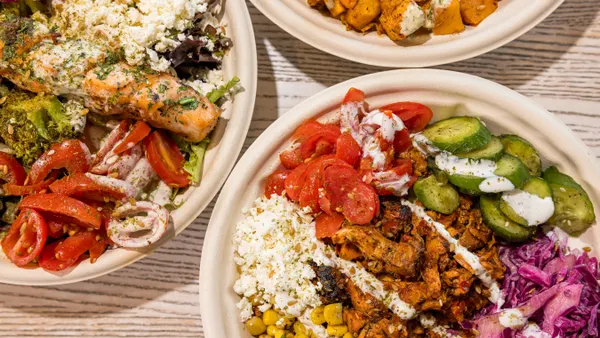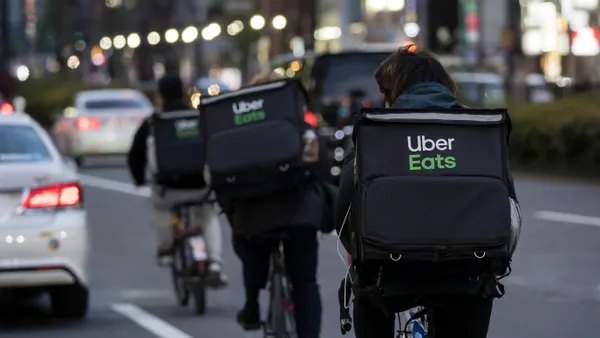UPDATE: Dec. 10, 2020: Washington, D.C., Attorney General Karl Racine sent DoorDash a cease-and-desist letter Tuesday warning the aggregator that charging restaurants more than 15% in commissions for its DashPass program may violate the District's delivery fee cap, The Hill reports. The attorney general's office requested a response to its letter by Wednesday.
DoorDash did not confirm whether it responded to the letter, but told Restaurant Dive in an email Thursday that the company has "decided not to charge DC restaurants their contractual DashPass rate at this time." The District's 15% delivery fee cap is set to expire when the coronavirus public health emergency has ended.
"We recognize that there has been confusion as a result of our response to the unintended consequences of the pricing regulations in Washington, DC," a DoorDash spokesperson wrote. "We look forward to engaging with local policymakers to increase understanding of the impact pricing regulations have, and solutions that better serve customers, Dashers, and restaurants."
Dive Brief:
- About eight months after Washington, D.C. placed a 15% cap on third-party delivery commission fees to help restaurants during the pandemic, DoorDash appears to have found a workaround. According to the Washington City Paper, restaurants that use DoorDash's DashPass subscription feature were sent a notice stating that the cap is "only applicable to Classic orders" and doesn't apply to the DashPass program.
- In its notice, DoorDash calls DashPass an "optional, premium offering and separate from DoorDash's core services." The company said that beginning Dec. 9, it will begin charging restaurants the contractual rate in their original agreements, City Paper reports. The changes to DashPash charges are part of a limited test in fewer than five cities, including D.C. and cities in the Bay Area. Merchants can choose to opt out of DashPass at any time, a DoorDash spokesperson said.
- The spokesperson called delivery fee restrictions a "one-size fits all" solution that impacts the company's ability to provide quality service and pay. Merchant fees help the company cover business costs like Dasher pay, background checks, occupational Dasher insurance and website upkeep, the spokesperson said.
Dive Insight:
DashPass users pay $9.99 a month in exchange for unlimited deliveries with zero fees on orders that are $15 or more. The program offers restaurants more visibility to the 5 million diners enrolled in the program. DoorDash calls DashPass a "premium marketing offering" that charges subscribers $0 in delivery fees, making them more likely to order from DashPass restaurants and give partner restaurants a sales boost. Opting out of this program could remove significant marketing and visibility benefits from the most loyal delivery customers for partner restaurants.
One restaurant operator told the Washington City Paper it will go back to paying 30% commission fees this week as a DashPass member, adding that the change, "seems dishonest to use a promotional program we already pay extra to be included in to get around local restrictions that are keeping our business alive." Not all restaurants in D.C. that use DashPass will be charged 30%, a DoorDash spokesperson said. Some will have lower commission rates based on their original contracts.
Restaurant owners have applauded commission caps, particularly as delivery becomes more critical amid rising coronavirus cases and lingering restrictions. One Las Vegas operator said caps will "save local businesses a huge amount of money," claiming third-party fees cost nearly $7,000 a month.
Other delivery companies have also pushed back on caps, which exist in a number of cities including Los Angeles, New York, Chicago and Denver. Grubhub has called such caps a "food delivery tax" that increase how much consumers pay, limit restaurant orders and result in less work for drivers.
DoorDash's test may not last long. Language in D.C.'s legislation fails to exempt programs like DashPass, and council members aren't convinced such wiggle room exists. Ward 3 Councilmember Mary M. Cheh told the Washington City Paper, "If there is a gap in the law that would permit DoorDash to do this … then I will move swiftly to amend the law and close any loophole."
If that law is not amended, DoorDash may not be alone in leveraging the language loophole for its subscription service. Uber Eats could do the same with its Eats Pass program, while Grubhub could also do so with its Grubhub+ program. This could lead to a drop off of restaurant subscription members, however, which could make it harder to incentivize consumers to join and, ultimately, affect a highly efficient part of the delivery business. The DoorDash DashPass subscription program, for example, pays for itself if consumers order delivery just a few times a month.
Emma Liem Beckett contributed to this article.









